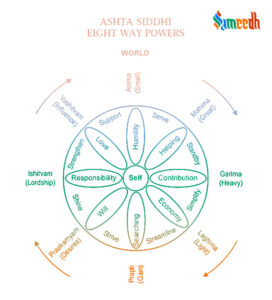Laghima Siddhi specifically refers to the ability to become weightless or to make oneself lighter than air. Those who attain this siddhi are believed to have mastery over their physical body to the extent that they can defy the force of gravity and float or levitate effortlessly.

In Hinduism, Laghima Siddhi is one of the eight primary siddhis, or spiritual powers, mentioned in various scriptures, including the Yoga Sutras of Patanjali and Tantric texts. It refers to the ability to become weightless or extremely light.
Like other siddhis, Laghima Siddhi represents mastery over the physical body and control over the material world. It symbolizes the profound potential within each individual to transcend the limitations of physical existence through spiritual practice and discipline.
Contrasting to Garima Siddhi, Laghima enables one to become light as air or simply weightless. By converting into a weightless being, one can then go on possessing the capability to fly too. As you start weighing lighter than feather, you can take flight with ease. Hanuman was one of the Hindu gods who could take off into the sky whenever he wanted to.
Stories directly focusing on Laghima Siddhi, the ability to become weightless or to make oneself lighter than air, might not be as prevalent in Hindu mythology and literature as those of other siddhis. However, there are some instances where characters demonstrate similar themes or abilities related to the concept. Here is are few examples:
- Sage Agastya and His Travel to Lanka: In Hindu mythology, Sage Agastya is revered as a great sage and a master of various mystical powers. One popular story involves Agastya’s journey to Lanka (present-day Sri Lanka) to balance the Earth’s population. In some versions of the tale, Agastya is said to have traveled to Lanka by shrinking himself to the size of a thumb and then expanding himself to cross the ocean. While this story doesn’t directly focus on Laghima Siddhi, it contains elements of altering one’s size and transcending physical limitations, which are related to the concept of siddhis.
- Krushna and Rukmini’s Wedding: In some versions of the story of Lord Krushna’s wedding to Princess Rukmini, it’s said that during the wedding procession, the chariot carrying Lord Krushna and Rukmini became too heavy for the horses to pull. To ease the burden, Lord Krushna made himself weightless, allowing the horses to easily transport the chariot. While this story doesn’t directly mention Laghima Siddhi, it illustrates the idea of transcending physical limitations and altering one’s weight, which is related to the concept of siddhis.
These stories contain elements or themes that align with the idea of beings transcending physical limitations or altering their size and weight, which are central to the concept of siddhis, including Laghima Siddhi, in Hinduism.
Here are some aspects of the significance of Laghima Siddhi in Hinduism:
- Testimony to Spiritual Progress: Attaining Laghima Siddhi is considered a significant milestone on the spiritual path. It demonstrates the practitioner’s progress in their spiritual journey, indicating their dedication, discipline, and mastery over the mind and body.
- Manifestation of Divine Grace: In some interpretations, the attainment of siddhis, including Laghima Siddhi, is seen as a manifestation of divine grace. It signifies the blessings bestowed upon the practitioner by the divine, affirming their spiritual growth and alignment with the cosmic order.
- Tool for Service and Self-realization: Practitioners who attain Laghima Siddhi may use their abilities to serve others or to deepen their own spiritual practice. By becoming weightless, they may experience a sense of detachment from the material world and gain insight into the nature of reality and consciousness.
- Inner Transformation: Laghima Siddhi also signifies inner transformation and the dissolution of the ego. By transcending the limitations of gravity, practitioners may cultivate a sense of lightness and freedom from attachments, leading to greater inner peace and spiritual awakening.
- Ultimate Surrender to Divine Will: While Laghima Siddhi demonstrates extraordinary powers, it also serves as a reminder of the ultimate surrender to divine will. Practitioners must use these powers selflessly and in accordance with dharma (righteous duty), recognizing that true fulfillment lies not in the attainment of siddhis but in union with the divine.
Overall, Laghima Siddhi holds significance in Hinduism as a symbol of spiritual mastery, divine grace, and the boundless potential of the human spirit. It underscores the transformative power of spiritual practice and the ultimate goal of realizing one’s inherent divinity.